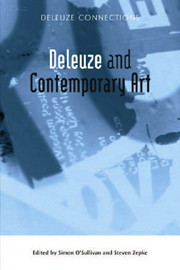Book contents
- Frontmatter
- Contents
- Acknowledgements
- List of Illustrations
- Introduction: Deleuze and Guattari and Contemporary Art
- POLITICS
- THE AESTHETIC PARADIGM
- SCENES AND ENCOUNTERS
- 9 An Art Scene as Big as the Ritz: The Logic of Scenes
- 10 Abstract Humour, Humorous Abstraction
- 11 From Aesthetics to the Abstract Machine: Deleuze, Guattari and Contemporary Art Practice
- 12 Traps Against Capture
- TECHNOLOGIES
- Notes on Contributors
- Index
10 - Abstract Humour, Humorous Abstraction
from SCENES AND ENCOUNTERS
Published online by Cambridge University Press: 12 September 2012
- Frontmatter
- Contents
- Acknowledgements
- List of Illustrations
- Introduction: Deleuze and Guattari and Contemporary Art
- POLITICS
- THE AESTHETIC PARADIGM
- SCENES AND ENCOUNTERS
- 9 An Art Scene as Big as the Ritz: The Logic of Scenes
- 10 Abstract Humour, Humorous Abstraction
- 11 From Aesthetics to the Abstract Machine: Deleuze, Guattari and Contemporary Art Practice
- 12 Traps Against Capture
- TECHNOLOGIES
- Notes on Contributors
- Index
Summary
Abstract Humour
About ten years ago I was taking part in a graduate seminar held in a room at a gallery that was showing a retrospective of the work of the American artist Haim Steinbach. We were all sat in a circle around the artist who was responding to questions from the students. It wasn't going too well, the atmosphere was a bit stiff and the questions weren't really that interesting. Most of the students were quite familiar with the work, it being a paradigmatic, almost textbook example of the kind of art we used to call ‘postmodern’ back then. Most of them were familiar with the critical discourse around the work and how it was seen to critically reflect upon the contemporary ‘economy of the object’, ‘exhibition value’ and how it partook of the critique of ‘autonomy’, ‘transcendence’ and ‘originality’.
Suddenly, a student got up and walked towards one of the works – a typical Steinbach consisting of a quasi-Donald Judd shelf unit upon which were placed shop-bought commodities. He then started to move some of the carefully arranged objects; he placed one on its side, one upside-down and placed another half over the edge of the shelf. He then asked, ‘how does this change the work?’ Everyone was palpably nonplussed, including the artist. After a while an embarrassed silence gave way to a stilted laughter.
- Type
- Chapter
- Information
- Deleuze and Contemporary Art , pp. 176 - 188Publisher: Edinburgh University PressPrint publication year: 2010



